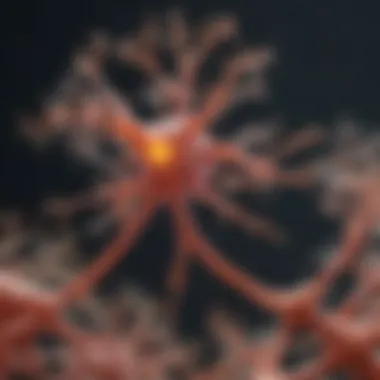Navigating Early Onset Dementia Treatment


Intro
The onset of dementia at an early age introduces a range of challenges that are not typically encountered with traditional forms of dementia. Early onset dementia can emerge in individuals as young as their thirties and can profoundly affect not only the individuals diagnosed but also their families and caregivers. It is essential to address the complexities involved in treatment, diagnosis, and ongoing care.
In this article, we delve into the critical aspects of treating early onset dementia. We will highlight several key findings from recent research, explore the realities of living with this condition, and emphasize the importance of a multidisciplinary approach.
Article Overview
Summary of Key Findings
Recent findings have demonstrated that early intervention plays a vital role in managing early onset dementia. Research suggests that cognitive interventions combined with psychosocial support can improve the quality of life for those affected. The necessity of personalized care plans is underscored, emphasizing that a single-size-fits-all approach is inadequate. Additionally, ethical considerations in treatment and care planning have been recognized as paramount in ensuring respect for the autonomy and dignity of individuals diagnosed with early onset dementia.
Research Objectives
The objective of this article is to:
- Provide thorough insights into the current strategies for treating early onset dementia.
- Discuss emerging research and its implications for care practices.
- Highlight the importance of early intervention and supportive therapies.
- Address ethical considerations in diagnosis and treatment.
- Advocate for a multidisciplinary approach to management that includes healthcare, social support, and community resources.
Key Results and Discussions
Main Findings
Several significant findings arise when examining early onset dementia treatment. First, cognitive therapies have shown promise in mitigating some cognitive declines. Patients engaging in targeted exercises exhibit improved cognitive functioning over time. Furthermore, supportive therapies such as counseling and support groups greatly assist in emotional and psychological aspects, helping families cope with the ramifications of the illness.
Implications of Findings
The implications of these findings extend beyond clinical practices. They invite a shift in how society perceives and addresses early onset dementia. Enhanced support structures, training for family members, and increased awareness are crucial. Moreover, these findings urge healthcare systems to evolve by integrating more community-centric resources that can support both individuals and families in navigating the challenges presented by the condition.
"An early diagnosis and tailored treatment plan can dramatically improve the lives of those affected by early onset dementia."
In summary, the treatment of early onset dementia requires nuanced understanding, compassionate care, and unwavering dedication. As more research unfolds, it will be vital to adapt strategies accordingly, keeping the focus on the individuals and families affected by this condition.
Understanding Early Onset Dementia
Understanding early onset dementia is crucial as it addresses a condition that affects individuals typically before the age of sixty-five. This aspect alone sets early onset dementia apart from more commonly known forms that usually manifest in later life. It often brings specific challenges for diagnosis and treatment, directly impacting the lives of those affected and their families.
This article aims to explore these challenges through various perspectives, highlighting the unique characteristics and needs of younger individuals facing this condition. By addressing early intervention, we will uncover the importance of recognizing symptoms sooner, which can lead to better outcomes. Moreover, we will discuss the complex landscape of supportive therapies needed for effective management.
In exploring this topic, we must consider the emotional and psychological toll that early onset dementia can exact not only on patients but also on caregivers and loved ones. Recognizing these dynamics is essential for developing comprehensive care strategies that promote quality of life. The intersection of medical, ethical, and social factors makes this an area ripe for inquiry and significant improvement.
Definition and Characteristics
Early onset dementia refers to the onset of a dementia syndrome before the age of sixty-five. This condition can present similar symptoms to other types of dementia, such as memory loss, confusion, and difficulties in communication. However, the implications of these symptoms can be even more profound, given that many affected individuals are still in the workforce or raising families.
Characteristic features include:
- Cognitive decline: Issues with memory, attention, and reasoning, which typically progress over time.
- Behavioral changes: Mood swings and personality shifts can often be observed.
- Functional decline: Difficulties in performing daily tasks which may escalate as the condition progresses.
Each of these characteristics presents its own set of challenges for diagnosis and management, requiring tailored approaches to care.
Epidemiology
The prevalence of early onset dementia is approximately 5-10% of all dementia cases, making it relatively rare compared to other types of dementia. However, the incidence appears to be increasing globally. Factors contributing to this rise include greater awareness, improved diagnostic techniques, and possibly environmental or genetic influences that are still under investigation.
Epidemiological studies show varying data depending on geographic location, genetic predispositions, and lifestyle factors. For instance, some populations report higher prevalence rates due to hereditary factors. Knowing the epidemiology helps researchers and healthcare professionals identify at-risk groups and allocate resources accordingly.
Common Types
Various types of dementia can manifest in younger individuals. Here are a few notable types:


- Alzheimer's Disease: The most common cause, typically presenting with progressive memory loss.
- Frontotemporal Dementia: Often characterized by changes in personality and behavior, along with language difficulties, this type is more common in people under fifty.
- Vascular Dementia: Resulting from issues with blood supply to the brain, it can occur due to strokes or other vascular conditions.
- Lewy Body Dementia: This type often includes fluctuating cognition, visual hallucinations, and Parkinsonian symptoms.
Understanding these types aids in the application of appropriate treatment strategies, and knowing the distinctions is essential for both diagnosis and prognosis.
Diagnosis of Early Onset Dementia
Diagnosing early onset dementia is a critical component of managing this complex condition. Understanding the signs and symptoms can lead to earlier interventions, which are crucial for improving the quality of life for individuals affected. Often, the diagnosis may be overlooked due to the assumption that dementia only affects older adults. Therefore, awareness and education around early onset dementia are essential for both healthcare professionals and the public.
The process of diagnosing early onset dementia involves multiple steps designed to build a comprehensive understanding of the individual’s cognitive state. Recognizing the importance of accurate diagnosis is fundamental. It allows for timely treatment options, better planning for the future, and can significantly ease the emotional burden on families.
Clinical Assessment
A clinical assessment serves as the initial step in diagnosing dementia. It often begins with a thorough review of the patient’s medical history and a discussion of symptoms. This helps clinicians identify any behavioral or cognitive changes that may have occurred. Key aspects include gathering detailed information about daily functioning, memory issues, and the emotional state of the individual.
Standardized tools, such as the Mini-Mental State Examination (MMSE), are frequently used during this phase. These assessments can give valuable insights into cognitive performance. Besides cognitive tests, evaluating functioning can provide clues about the individuals' ability to manage their day-to-day activities.
Neuropsychological Testing
Neuropsychological testing is a more in-depth evaluation that focuses on specific cognitive functions. This type of testing can assess various domains such as memory, attention, problem-solving, language, and visual-spatial skills.
These tests are conducted by trained psychologists. They analyze the patterns of cognitive strengths and weaknesses, which helps to differentiate early onset dementia from other potential disorders. The results from these tests can be crucial in determining the appropriate course of action for treatment and care.
Several common neuropsychological tests include:
- The Wechsler Adult Intelligence Scale
- The Boston Naming Test
- The Rey Auditory Verbal Learning Test
The results provide clinicians with the information needed to understand the cognitive challenges faced by the patients. It can have significant implications for their personal and professional lives.
Imaging Techniques
Imaging techniques play an essential role in the diagnosis of early onset dementia. They assist clinicians in visualizing brain changes that could indicate neurodegeneration. Common imaging methods include magnetic resonance imaging (MRI) and positron emission tomography (PET).
- MRI is especially valuable for detecting structural changes in the brain. It can reveal atrophy in areas associated with memory and cognitive function.
- PET scans can show how the brain is functioning and are useful in identifying abnormal metabolic patterns, which can help distinguish between different types of dementia.
These imaging techniques provide tangible evidence of the condition, reinforcing clinical assessments and neuropsychological testing. They help in confirming a diagnosis or ruling out other conditions, such as tumors or vascular problems, that could mimic dementia symptoms.
Treatment Approaches
Addressing early onset dementia requires a multifaceted strategy that encompasses various treatment approaches. Effective management significantly improves the quality of life for patients and offers support for families. Each treatment method caters to unique challenges associated with early onset dementia, making a tailored approach essential. This section will delve into pharmacological interventions, non-pharmacological strategies, and cognitive rehabilitation therapy.
Pharmacological Interventions
Pharmacological interventions play a crucial role in the management of early onset dementia. Common medications prescribed include cholinesterase inhibitors like Donepezil and Rivastigmine. These drugs may help enhance cognition by improving neurotransmitter activity. It is essential to recognize that while these medications can slow the progression of symptoms, they do not cure the disease. Patients should be monitored for potential side effects, which can range from gastrointestinal issues to sleep disturbances.
Moreover, behavioral symptoms often accompany early onset dementia. Doctors may prescribe antidepressants or antipsychotics to address issues like anxiety or agitation. Careful consideration is necessary when prescribing these medications, as older adults can be more susceptible to adverse effects.
Pharmacological interventions can provide significant benefits, but they are not a standalone solution.
Non-Pharmacological Strategies
Non-pharmacological strategies offer valuable support in managing early onset dementia. These strategies focus on enhancing well-being through lifestyle and environment modifications. One effective approach includes engaging patients in regular physical activity. Studies suggest that exercise can improve cognitive function and overall health.
Social stimulation is another important non-pharmacological strategy. Activities such as group therapy or art sessions can foster connections with others, combating feelings of isolation. Utilizing cognitive stimulation therapy (CST) encourages cognitive engagement in fun and meaningful ways.
Additionally, a structured daily routine can help patients feel more secure and reduce confusion. Creating a safe and familiar environment is vital. For instance, labeling common household items can aid in orientation and reduce frustration.
Cognitive Rehabilitation Therapy
Cognitive rehabilitation therapy focuses on enhancing cognitive function in individuals with dementia. This approach is designed to help patients regain or maintain cognitive skills through specific exercises and techniques. Therapy sessions typically involve one-on-one interaction with occupational therapists or neuropsychologists who tailor programs to suit individual needs.
The goals of cognitive rehabilitation include improving memory, attention, and problem-solving skills. Patients may engage in activities such as memory games or strategic puzzles. These exercises can bolster confidence and provide a sense of accomplishment.


Family involvement is crucial in cognitive rehabilitation. Educating loved ones on therapeutic approaches fosters better understanding. This collaboration can enhance the effectiveness of therapy. Moreover, involving families in routines creates a conducive environment for recovery.
Supportive Care and Management
Supportive care and management is a crucial component in the treatment of early onset dementia. This form of care is designed to enhance the quality of life for both individuals diagnosed with the condition and their families. Key elements include emotional support, practical assistance, and the promotion of independence. The benefits of supportive care are manifold, encompassing psychological well-being, maintaining dignity, and ensuring safety while addressing the progressive nature of the disease.
Role of Caregivers
Caregivers play a significant role in the lives of those with early onset dementia. They provide daily support, ensuring that individuals retain a sense of normalcy amidst the challenges posed by the condition. Caregivers are often family members, underscoring the importance of understanding their emotional and psychological needs. By fostering a healthy environment, caregivers can promote better outcomes for those they support.
- Emotional Validation: Caregivers must validate the feelings of individuals with dementia. This is essential for maintaining their dignity and self-worth.
- Routine Establishment: Creating structured routines can help individuals feel secure and reduce anxiety.
"Caregivers are often unaware of the toll the role can take on their own well-being. It is important for them to seek support too."
Balancing Independence and Support
Finding the right balance between independence and support is essential for individuals with early onset dementia. While support is critical, promoting autonomy can significantly enhance their quality of life. There are several considerations that families must address in this balancing act.
- Encouraging Self-Care: Individuals should be encouraged to engage in self-care activities as much as possible. This can help maintain a sense of control.
- Safety Measures: While supporting autonomy, caregivers must also implement safety measures to prevent harm.
Family discussions are important in establishing a balance that respects the preferences and abilities of the individual. This can lead to a more fulfilling life and stave off feelings of helplessness.
Utilizing Community Resources
Community resources are invaluable in providing additional support for individuals with early onset dementia and their caregivers. These resources can alleviate pressure and enhance the overall care experience. They range from local health services to support groups and educational programs.
- Support Groups: Joining support groups can provide a platform for caregivers and patients to share experiences and learn from one another.
- Respite Care: Short-term respite care can give caregivers a needed break while ensuring the individual still receives proper care.
- Local Initiatives: Many communities offer programs tailored to individuals with dementia, such as exercise classes, arts and crafts, and memory-enhancing activities.
Although finding and utilizing resources may require some effort, they can dramatically improve the caregiving experience and provide essential relief.
Psychosocial Impacts
Understanding the psychosocial impacts of early onset dementia is crucial for comprehending the overall experience of those affected. This aspect encompasses the emotional, behavioral, and social challenges that individuals and their families face. Recognizing these impacts early can lead to better management strategies and improve the quality of life for both patients and caregivers.
Emotional Well-being
Early onset dementia can significantly affect emotional well-being. Individuals may experience a range of emotions, including frustration, anger, and sadness, as they confront their changing mental landscape. The awareness of cognitive decline can lead to periods of depression. Families may also experience emotional turmoil, grappling with loss as they witness their loved one's gradual changes.
Supporting emotional health is vital. Interventions may include:
- Counseling: Mental health professionals can provide a safe space for expression and coping strategies.
- Support groups: Connecting with others in similar situations can reduce feelings of isolation.
- Mindfulness practices: Techniques such as meditation or gentle yoga can help improve mood and reduce stress.
These strategies foster resilience in individuals and families, creating pathways to maintaining emotional stability amidst challenges.
Family Dynamics
The impact of early onset dementia extends to family structures and relationships. Patients may struggle with communication, leading to misunderstandings and frustration. Family members often take on caregiving roles, which can shift the dynamics significantly. This shift may root itself in the need for emotional labor, often leading to changes in role expectations.
Family dynamics can benefit from targeted interventions. Considerations include:
- Family counseling sessions: These can offer a platform for addressing grievances and fostering communication.
- Role clarification: Clearly defining responsibilities within the family can alleviate confusion and conflict.
- Education about dementia: Understanding the disease can help families adjust their expectations and improve interactions.
Supporting family dynamics is important for fostering a nurturing environment where both the patient and caregivers can thrive.
Social Involvement and Isolation
Social involvement often diminishes as symptoms progress in early onset dementia. Individuals may withdraw from activities they once enjoyed, leading to increased feelings of isolation. This social withdrawal can significantly impact an individual's mental health and quality of life. Families may also face social isolation, as they might hesitate to engage with others about their loved one’s condition.
To combat isolation, several strategies can be employed:


- Encouraging participation in community events or support groups can help maintain connections.
- Leveraging technology: Tools like video calls can enable ongoing social interactions.
- Creating a supportive community: Building networks that welcome and assist those impacted creates a more inclusive environment.
By addressing isolation, both individuals and families can experience improved mental health and a stronger community connection.
"The psychosocial aspects of early onset dementia are often overlooked but play a critical role in the overall well-being of individuals and their families. Awareness and intervention are key."
Overall, recognizing, understanding, and addressing the psychosocial impacts of early onset dementia can significantly contribute to improving the quality of life for affected individuals and their support networks.
Emerging Research and Future Directions
Emerging research in early onset dementia is critical as it offers new perspectives on treatment and care management. The landscape of knowledge surrounding dementia, especially in individuals under sixty-five, is continually evolving. These insights can substantially impact both clinical practices and individual lives. Innovations in therapy and a deeper understanding of genetic factors lead to promising pathways for intervention. This section will cover specific elements, benefits, and considerations that highlight the significance of ongoing research in this area.
Innovative Therapies
Innovative therapies represent a beacon of hope in the treatment of early onset dementia. These approaches often include cutting-edge pharmaceutical options, along with novel non-pharmacological techniques. Research into disease-modifying drugs is gaining traction, aiming to not just alleviate symptoms but also address underlying pathological processes. For example, amyloid-targeting therapies have shown potential in altering dementia progression for patients with Alzheimer's disease.
In addition to medications, alternative therapies like mindfulness, art therapy, and music interventions are gaining popularity. These have been observed to improve quality of life for patients, fostering emotional expression and cognitive engagement. The integration of technology, such as virtual reality-based rehabilitation, also stands as an exciting frontier for enhancing cognitive function.
Genetic Studies and Biomarkers
Genetic studies play a pivotal role in understanding early onset dementia. Researchers are increasingly focusing on identifying specific genes linked to the condition. For instance, mutations in the PSEN1 gene can lead to familial Alzheimer's disease, which typically manifests before age sixty-five. Biomarker discovery is equally important as it holds potential for earlier diagnosis and personalized treatment plans.
Biomarkers can be proteins or other molecules found in the blood or cerebrospinal fluid that indicate the presence or risk of disease. The identification of such markers can aid clinicians in making informed decisions regarding interventions and potential outcomes. As research continues, it is crucial to balance the promise of these findings with ethical implications surrounding genetic testing and privacy issues.
Interdisciplinary Approaches to Treatment
Interdisciplinary approaches are essential for comprehensive care in early onset dementia. Collaboration among specialists, including neurologists, geriatricians, psychologists, and social workers, leads to more holistic treatment regimens. These teams can tailor interventions that address medical, emotional, and social needs concurrently.
For instance, integrating cognitive behavioral therapy with medication management can provide a more robust framework for addressing psychological symptoms. Involving family members in care discussions can further empower them and optimize support systems.
"Effective management of early onset dementia requires a multifaceted approach that encompasses various disciplines to address the needs of the individual comprehensively."
Ethical Considerations
The ethical considerations surrounding early onset dementia are multifaceted and critical to the management of the condition. The diagnosis often raises profound dilemmas regarding autonomy, dignity, and the quality of life of affected individuals. Those diagnosed must navigate a complex landscape where personal agency may be challenged by cognitive decline. Engaging with ethical questions not only enriches the understanding of the condition but also fosters a more humane approach to treatment and care.
Decision-Making Capacity
Decision-making capacity in individuals with early onset dementia is central to many ethical debates. This condition often impairs judgment and reasoning, raising concerns about the individual’s ability to understand their medical options and make informed choices. It is crucial to assess decision-making capacity regularly, as this can fluctuate based on the severity of the symptoms. Health care providers must respect autonomy while also protecting vulnerable patients from potential harm. Educating families about these dynamics can provide clarity and facilitate appropriate involvement in care planning.
End-of-Life Issues
End-of-life issues present a significant ethical challenge when caring for individuals with early onset dementia. As cognitive decline progresses, patients may lose the ability to communicate their wishes, leading to distressing situations for families and caregivers left to make critical decisions. Advanced care planning becomes vital in these scenarios. Discussions about treatment preferences and quality of life should occur while the individual can participate actively. A focus on palliative care can help ensure that the person's dignity is maintained even in later stages of the disease.
Resource Allocation
Resource allocation is another critical ethical issue in the context of treating early onset dementia. Limited health care resources can lead to disparities in the quality of care provided to individuals. There is an ethical imperative to ensure fair access to treatment options, support services, and specialized care for all individuals affected by the condition. Policymakers need to consider these ethical dimensions when developing programs and funding initiatives. Engaging various stakeholders can also promote a more equitable system, ensuring that those affected receive the necessary support throughout their journey.
Ethical considerations are not merely bureaucratic obligations, but are foundational to the compassionate care of individuals facing early onset dementia.
Ending
The conclusion of an article on treating early onset dementia is a pivotal segment that synthesizes the discussions and offers insights into the complexities of the subject. Given the multifaceted nature of early onset dementia, it emphasizes the importance of comprehensive and cohesive strategies. These strategies must encompass medical, psychological, and social dimensions to effectively support individuals diagnosed with this condition.
Summary of Key Points
In this article, several critical points have been explored:
- Understanding Early Onset Dementia: We defined the condition, highlighting its unique characteristics and the common types that prevail in younger populations.
- Diagnosis: We examined the processes involved in diagnosing early onset dementia, including clinical assessments and imaging techniques, emphasizing the need for accurate and timely diagnosis.
- Treatment Approaches: Various treatment avenues were detailed, from pharmacological interventions to non-pharmacological strategies, such as cognitive rehabilitation therapy, that aim for holistic management.
- Supportive Care: The role of caregivers and community resources was discussed, underscoring the vital support system necessary to enhance the quality of life for patients.
- Psychosocial Impacts: The emotional and social dynamics faced by individuals and their families were analyzed, stressing the need for emotional well-being alongside physical treatment.
- Emerging Research: Innovative therapies and genetic studies that show promise for future treatments were explored, pointing to a hopeful horizon in dementia care.
- Ethical Considerations: We addressed critical ethical issues, including decision-making capacity and resource allocation, necessary for ensuring dignity in care.
Each of these components plays a crucial role in understanding and addressing the struggle of early onset dementia, marking the need for a thorough approach that integrates medical knowledge with compassion.
Call for Increased Awareness and Research
In light of the insights presented, it is imperative to call for heightened awareness and dedicated research on early onset dementia.
- Awareness: There exists a knowledge gap surrounding this condition. Public understanding must improve to recognize early signs, which could lead to earlier diagnoses and interventions. Campaigns aimed at education can help demystify the condition.
- Research: Continued study is essential to better understand the biological underpinnings of early onset dementia. Investment in research can drive innovative therapies and enhance quality of life for patients and families affected.
- Collaboration: Multidisciplinary collaboration between healthcare providers, researchers, and community organizations can yield fruitful outcomes. Resources must be allocated not only for treatment but also for developing support systems and educational materials.







